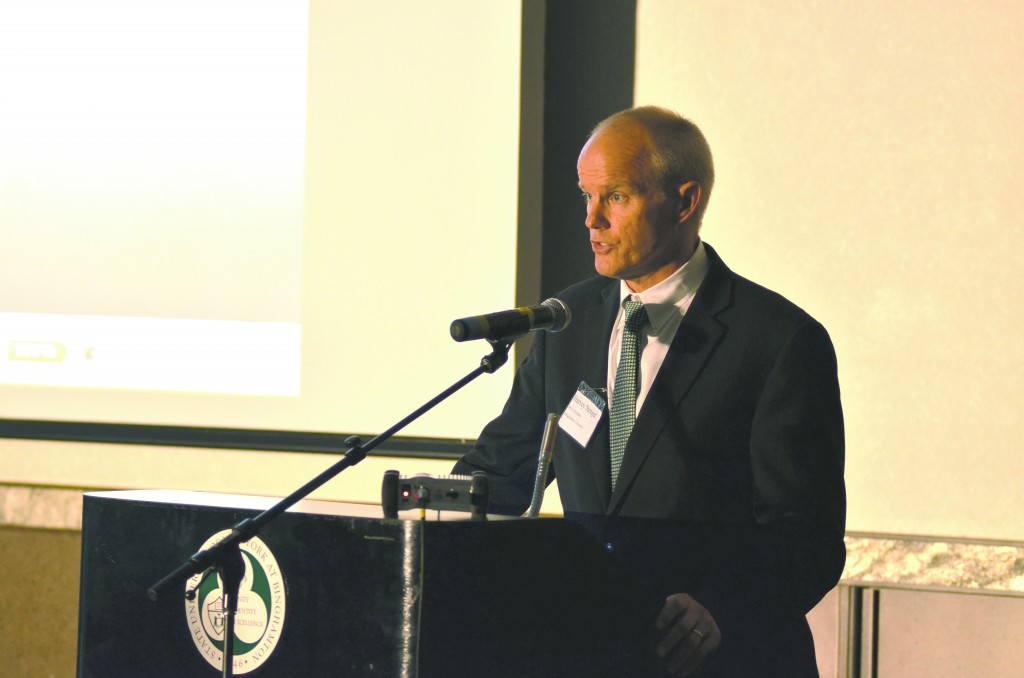
On Thursday night, professors, local physicians and students gathered in Old Union Hall to discuss biological, social and economic implications of rising rates of diseases at the second annual Global Health Conference at Binghamton University.
The conference, which was hosted by Universities Allied for Essential Medicines (UAEM), featured Binghamton University faculty discussing their research and experiences to create a better understanding of global health issues.
The event was organized into four, 15-minute panels discussing topics such as access to healthcare, chartitable care and healthcare in developing countries.
Dinesh Kommareddy, president of UAEM and a senior majoring in biochemistry, said that the interdisciplinary aspect of the conference was necessary.
“We wanted to address all the facets of contemporary global health issues,” Kommareddy said. “That involves addressing the disease itself, the economic, social, behavioral, business framework perspective of disease.”
Titilayo Okoror, a professor in the department of African studies, dissected previous definitions of what it means to be healthy and presented new ways to approach disease control in a time of massive globalization.
According to Okoror, previous approaches to eradicate disease focused solely on the scientific aspect instead of the patients or did not consider cultural implications of diseases.
She stressed an equal partnership model of approaching disease control in developing countries by having health care professionals work with the communities and understand cultural differences between doctors and locals. She presented the “Three H” model when confronting disease and globalization: hunger, honesty and humility.
“You want to be hungry in wanting to know more, you want to be honest in seeking to know, and most importantly, you want to be humble in knowing not all is known,” Okoror said.
Victoria Rizzo, department chair of social work, explained that social inequalities such as poverty and discrimination contribute to an increase of long-term diseases. To combat the rising rates, she said that unequal access to health care due to social inequalities must be addressed.
“Instead what we have is a fundamental right to the resources that promote health,” Rizzo said. “These include good prenatal care, good maternal care, access to good nutrition when we’re young, and these resources can delay or prevent the onset of disease.”
Diseases do not only stem from viruses or bacterium, but also can be caused by stressful environments due to structural and social inequalities, said Elizabeth DiGangi, a professor of anthropology.
“Massive inequality leads to environmental stress,” DiGangi said. “That stress actually leads to biological stress and it manifests itself in individuals.”
She added that patterns of stress were appearing in developed countries like the United States, where a small number of people hold the majority of power.
“We need to think about how gross inequity … ultimately leads to structural violence and potentially feeds all these biological problems that we see,” DiGangi said, referring to health problems like arthritis and tooth decay.
Dana Ratikan, a junior majoring in biology, said that DiGangi’s presentation on violence and its effects on health provided an interesting perspective on healthcare.
“I think it’s very inspirational and very eye-opening to hear about how global health is a major part of society,” Ratikan said. “A lot of people are not aware of the conditions in other countries and take for granted what they have here.”
Sheena Finlayson, a senior double-majoring in bioathropology and archeology and treasurer of UAEM, said she hoped that the variety of departments represented at the conference would encourage students outside of science majors to become involved in global health.
“I hope that people realize that global health is not a biological issue or an anthropological issue, it’s a human issue,” Finlayson said. “This is something we all need to take a part in and not just those looking into medicine.”
Some students, like Jabari Nicholls, a junior majoring in biochemistry, found personal reasons to get involved in global health.
“It’s something that we take for granted here,” Nicholls said. “Some of my family comes from developing countries and they don’t have access to good doctors or medical care. There’s work that needs to be done.”


